What Is Affiliate Marketing And How Does It Work?
Affiliate marketing is a type of performance-based marketing in which a business rewards one or more affiliates for each visitor or customer brought by the affiliate's own marketing efforts. ....
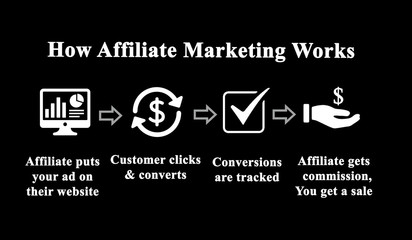
Affiliate marketing has become a popular way to earn money online for both advertisers and publishers. It is a type of performance-based marketing where advertisers pay publishers a commission for promoting their products or services.
In this article, we will discuss in detail what affiliate marketing is and how it works.
What Is Affiliate Marketing?
Affiliate marketing is a type of digital marketing where advertisers (also known as merchants or vendors) pay publishers (also known as affiliates) a commission for promoting their products or services.
The publisher promotes the advertiser's products or services on their website or through other marketing channels such as email, social media, or search engine advertising.
How does affiliate marketing work?
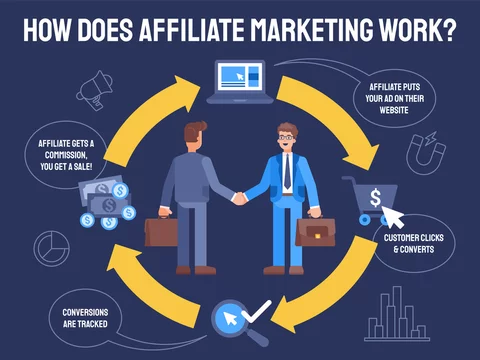
When a company signs up for an affiliate program, it provides the affiliate with a unique link to its website. The affiliate then promotes the company's products or services on its website, blog, or social media. When a customer clicks on the affiliate's link and makes a purchase, the affiliate receives a commission.
The affiliate marketing process involves four main players: the advertiser, the publisher, the network, and the customer.
-
Advertiser: An advertiser is a business that wants to promote its products or services. They sign up for an affiliate program and provide the publisher with a unique affiliate link to track the sales and commissions.
-
Publisher: A publisher is a person or a company that promotes the advertiser's products or services. They sign up for an affiliate program and promote the products or services through their website, blog, social media, or other marketing channels. The publisher gets paid a commission for each sale made through their unique affiliate link.
-
Network: An affiliate network is a platform that connects advertisers and publishers. The network provides tracking, reporting, and payment services for the affiliate program.
-
Customer: The customer is the person who clicks on the affiliate link and makes a purchase. The customer does not pay anything extra for the product or service they purchase through the affiliate link.
The market has grown in complexity and includes a variety of players, including specialized third parties, super-affiliates, and sub-affiliates.
Affiliate marketing is widely used on the Internet as a means of promoting products and services. Many websites and blogs embed affiliate links (a specific URL containing the affiliate's ID or username) in their content, earning from sales when their readers click on it and make a purchase.
Benefits of Affiliate Marketing
Affiliate marketing offers several benefits to both advertisers and publishers. Here are some of them:
-
Low Risk: Advertisers only pay for the actual sales made through the affiliate link. Publishers do not have to invest any money in promoting the products or services.
-
Increased Reach: Advertisers can reach a wider audience by leveraging the publisher's audience and marketing channels.
-
Cost-effective: Advertisers only pay for the sales made through the affiliate link, making it a cost-effective marketing strategy.
-
Passive Income: Publishers can earn passive income by promoting the advertiser's products or services through their website or other marketing channels.
How do affiliate marketers get paid?
There are five main ways affiliates get paid: pay-per-action, pay-per-install, pay-per-lead, pay-per-sale, and pay-per-click.
-
Pay-per-action: Here you receive a commission for a specific action. Many affiliate programs use this payout model because it is broad and can be applied to different offers: Newsletter signup, a click, a contact request, submitting a form, etc.
-
Pay per install: in this model, you get paid for each install generated by your website traffic. The goal of your content would be to promote mobile apps and software so that users download or install them.
-
Pay-per-lead: In this model, you get paid every time someone signs up for something. This is a popular payout method as companies use it for sweepstakes, lead generation, and other types of offers. Cost-per-lead offers are popular with beginners because it's easier to generate leads than to sell products to an audience.
-
Pay-per-sale: This is where the affiliate is paid a commission for each sale they generate. This is usually a percentage of the sale price and one of the most effective ways to make money from your website or blog.
-
Pay-per-click: This is where the affiliate is paid a commission for each visitor they refer to the merchant's website. This can be a highly effective way to drive traffic to your website, but it can also be a bit more expensive than pay-per-sale affiliate marketing.
Affiliate marketing is a viable way to earn extra income if you have a blog, website, or social media page. To make money with affiliate advertising you need to have a substantial number of visitors to your website. If you do not have enough visitors, you will not make money.
Types of affiliate marketing
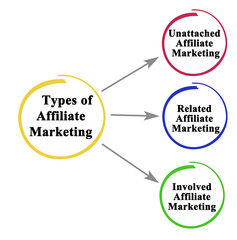
There are three types of affiliate marketing, namely:
-
Unattached affiliate marketing: These are simple pay-per-click affiliate marketing campaigns where you've no presence or authority in the niche of the product you're promoting.
-
Related affiliate marketing: This is where you've some form of online presence, whether it's through a blog, podcast, videos, or social media, and you've affiliate links to products related to your niche, but they're for products you don't use.
- Involved affiliate marketing: This is where you've used a product or service, are passionate about it, and personally recommend it to your audience.
Tools for affiliate marketers
Several different affiliate marketing tools will help you run your affiliate marketing business. But before you do, there are a few things you should keep in mind:
-
You need a reliable website/blog through which you can attract visitors and host your affiliate links. A website is essential for affiliate marketing because that's where you will promote your affiliate products. You can use your website to write articles, create product reviews, and much more.
-
For your website to be found, you need to use methods to increase traffic, such as search engine optimization (SEO) or pay-per-click (PPC) advertising.
-
You should have a strong social media presence, as this will help you reach a larger audience.
Below is a brief overview of some of the most commonly used tools:
-
Ad tracking software like Everflow.io. The software will help you track your advertising campaigns, so you can see which ones are doing well and which ones need to be improved.
-
Link cloaking tool. With this tool, you can change your affiliate link from the default "flimsy" link that contains the affiliate code to a more attractive link. This can help you improve your conversion rate by making your links more clickable. An uncloaked affiliate link is usually very long and looks something like this: mywebsite.com/product/order/24575x. However, after cloaking or masking, it becomes something like: thiswebsite.com/productyxz, which is shorter and easier to manage. You could use a tool like Genius Link.
-
Network performance analysis tool. This allows affiliates to downgrade poorly performing links, double missed opportunities, and increase commissions. You can use a tool like AffJet.
-
Keyword research tool: This helps you find the right keywords for your affiliate campaigns. It can help you get more traffic and conversions by targeting the right keywords. You can use tools like Moz Keyword Planner, Google Ads Keyword Planner, or Keywords Everywhere.
Tips for success with affiliate marketing
Getting started with affiliate marketing isn't easy. It can take a while to get on the right track because you need to hone your skills and have the right tools. Also, you need to be able to generate a lot of website traffic to convert visitors into sales, something which is not always instant.
If you're interested in becoming an affiliate marketer and you are willing to put in the effort, here are some tips:
-
Sign up with several affiliate networks. Once you're a member of an affiliate program, you can start promoting products on your blog or website. However, to maximize your earning potential, you should sign up with multiple affiliate networks. That way, you'll have a wider selection of products to promote and the opportunity to earn commissions from more than one company.
-
Choose products that are relevant to your niche. When choosing products to promote, make sure they're relevant to the content on your blog or website. For example, if you write about health and fitness, marketing weight loss supplements makes hardly any sense. But if you're promoting healthy foods and exercise equipment, that would be more appropriate.
-
Create helpful product reviews and guides. People are more likely to click on your affiliate links if they believe you're an expert on the products you recommend. So don't just write general blog posts about your niche, write helpful reviews about specific products. You can also produce guides that show people how to get the most out of certain products.
Also, make sure that you:
-
Find the right affiliate program. Look for a program that offers commissions on sales, a robust tracking system, and creative resources for promoting the brand's products.
-
Promote the right products. Choose products that align with your interests and that you're comfortable recommending to your followers. This will help you improve your affiliate income.
-
Be transparent about your relationship with the brand. Disclose it. Inform your website visitors that you'll receive a small commission on each sale, at no additional cost to them. When you're open about your relationship with the brand, you build trust with your followers.
-
Use creative resources. The brand should provide you with creative resources, such as banners and images, so you can effectively promote their products.
-
Monitor your results. Use the tracking system provided by the affiliate program to track your sales and commissions. This way you can measure your success and make the necessary adjustments to your strategy.
Affiliate marketing is a very effective way for brands to increase sales and for influencers to monetize their platform. If you find the right program and promote the right products, you can be successful with affiliate marketing.
Affiliate marketing programs and networks
An affiliate marketing program is a form of online advertising in which a company pays a "publisher" a commission for promoting the company's product or service.
The publisher is usually a website or blog owner who agrees to promote the company's product in exchange for a commission on sales or leads generated.
There are a variety of affiliate marketing programs to choose from. While there are many factors to consider when choosing a program, each program has its advantages and disadvantages.
Below, we've compiled a list of some of the programs and networks to help you get started.
Affiliate marketing programs
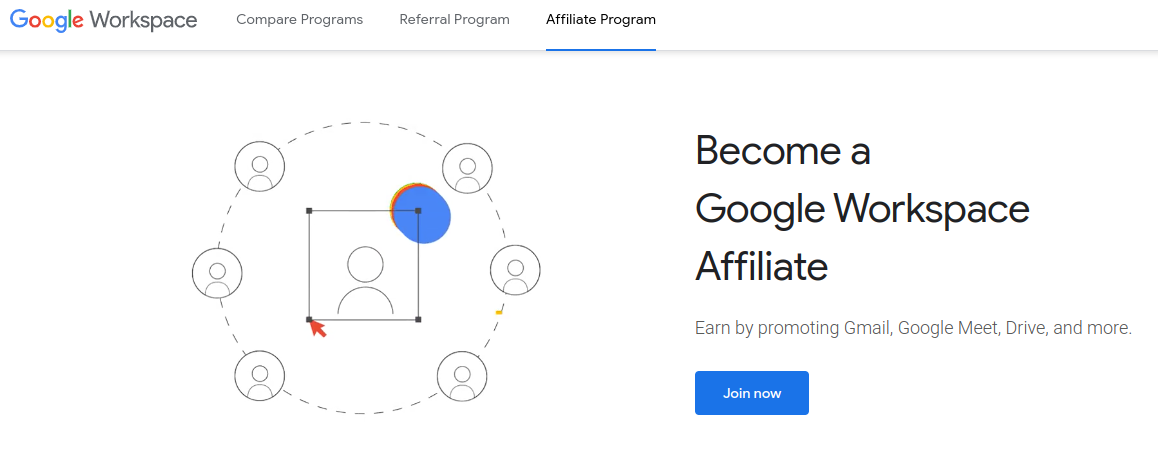
Affiliate marketing programs typically involve the use of banners, text links, and tracking codes to promote a merchant's products or services.
When a user clicks on one of these links or banner ads, he or she is redirected to the merchant's website. There, he or she may be prompted to make a purchase or take some other action. If the user performs the requested action, the affiliate marketing program pays a commission to the affiliate who generated the lead or sale. Here are some of them:
Bonus: Here is a link to over 350 affiliate programs you can join and make some quick bucks.
Affiliate marketing network
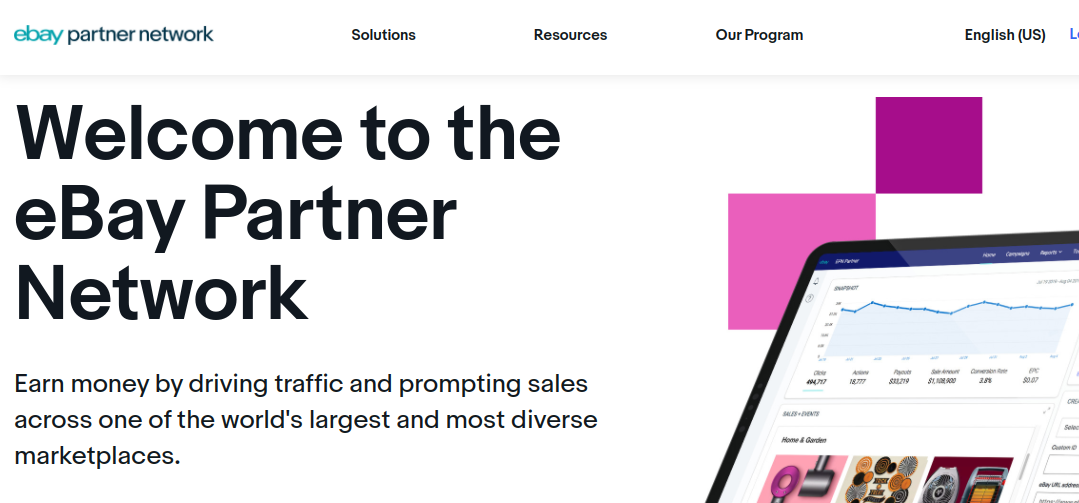
An affiliate network is a type of e-commerce platform that allows companies to connect with affiliates (i.e., people who promote their products) and control the affiliate relationship. These networks typically offer tools and resources to help companies track their affiliates, pay them commissions, and manage their affiliate relationships.
Affiliate networks provide a central location where retailers and affiliates can find each other and manage their relationships. They also provide tools and resources that both parties can use to maximize their success.
Here are a few of them:
These are just some of the most effective affiliate marketing programs and networks available. Sign up on any of the above affiliate platforms, visit their website, and create an affiliate account. Then, apply, wait for approval, and then begin blogging about the products or services once accepted.
When choosing a program, pay attention:
-
Consider your business goals and target audience.
-
The network is reputable and has a high reputation.
-
The network offers the tools and resources you need to manage your affiliate relationships.
-
Finally, make sure the network offers competitive commissions.
With so many programs to choose from, you are sure to find one that's right for you.
Types of products affiliates promote
There are many different types of products that affiliates can promote. These include physical products, digital products, and even services. Each type of product has its benefits and drawbacks, so it's wise to choose the right type of product to promote.
Physical products are tangible items that can be shipped to customers. These are the most common type of product that is sold through affiliate marketing.
Digital products are items that are delivered electronically, such as ebooks, software, and online courses. Services are intangible products that are provided by businesses, such as consulting services, web design services, and online marketing services.
Types of affiliate commissions
An affiliate commission is a fee that is charged by an affiliate program for directing customers to their business. This fee is usually a percentage of the total sale and is paid to the affiliate who refers the customer. For example, if an affiliate program charges a 5% affiliate commission and a customer purchases $100, the affiliate who referred the customer will earn $5.
There are two types of affiliate commissions that you can earn as an affiliate marketer. Here are they:
One-time affiliate commissions
One-time affiliate commissions are commissions that are only paid out once, rather than regularly. This type of commission is often used to incentivize affiliates to promote a product or service that they may not be familiar with.
For example, if a company is launching a new product, it may offer a one-time affiliate commission to help get the word out.
Recurring /lifetime commissions
Recurring affiliate commissions are a type of affiliate commission that allows affiliate marketers to earn a commission for every recurring payment made by a customer. This type of commission is generally offered by subscription-based companies, such as SaaS providers and membership sites.
Recurring affiliate commissions can be a very effective way to generate passive income, as you can continue to earn commissions from customers who remain subscribed to a service.
Furthermore, as customers tend to stay with subscription-based services for extended periods, you can potentially earn a substantial amount of money from a single customer.
Conclusion
Affiliate marketing is a powerful digital marketing strategy that offers benefits to both advertisers and publishers. By following the steps mentioned in this article, you can get started with affiliate marketing and earn passive income.
If you are an advertiser, affiliate marketing can help you reach a wider audience and increase sales. If you are a publisher, affiliate marketing can help you earn passive income by promoting the advertiser's products or services.
If you need help with your first steps in affiliate marketing, do not hesitate to contact us.

Strategist Profile
Abala Tom
Digital systems strategist specializing in high-performance SEO, Google Ads, and conversion optimization. Mission: to replace marketing 'guesswork' with predictable revenue systems.